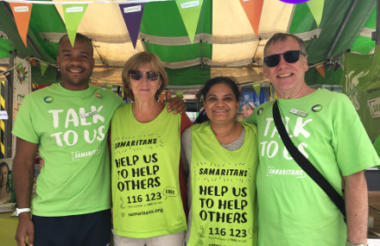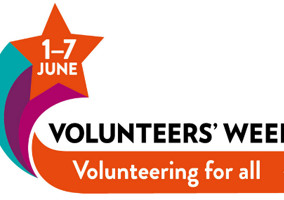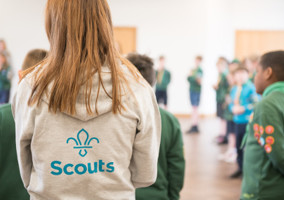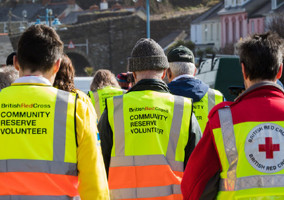“Samaritans’ volunteers offer something incredibly special. People call us when they are struggling to cope and want to talk to someone about it. They are probably at their most vulnerable, so it is a major act of trust. Trust is a fundamental part of what makes Samaritans work. People reach out to us when they are at their lowest point, and this takes courage.
For our callers, knowing that the person at the end of the line is there because they want to be and not because they are being paid, may make the difference between them calling us, or not.
Because it’s an important part of what we offer, we want to build on this feeling of trust. In keeping with the theme of this year’s Volunteers’ Week, ‘Volunteering for All’, we want to become more diverse and representative of the communities that need Samaritans the most. For example, we know that men, and those from lower socio-economic groups, are more at risk of suicide.
Attracting more volunteers
If we can attract more volunteers from these groups, we can build that feeling of trust and make a difference to a person in their time of need. It helps people to relate to the voice at the end of the phone. Ultimately it might mean the difference between a life saved, or lost. We’ve done a lot in this area already. Just head to our Twitter, Facebook and Instagram channels across the Week to see a snapshot of our volunteers – who they are and why they give their time.
Philip from Bridgend, who has been a volunteer for 40 years, takes to the streets to let the local community know about Samaritans. “It’s the awareness raising that we do on the street, how we let people know what Samaritans is, and that our volunteers are available 24/7, and they know that they can visit us at the branch,” he said.
Young people are another group we’d like to attract more volunteers from. Elena is 29 and a software developer by day. She says: “Samaritans is totally different from my real job, which is a part of it I really like. It shows that you can never really judge anyone, because you don’t know what someone is going through. Sometimes you just need someone to listen and say: ‘that sounds really tough’, and be there with you in that moment.”
About emphasising and providing emotional support, not judging
Which illustrates that being a Samaritans volunteer is also about empathising, providing emotional support to the person at the end of the line and not judging, whatever the circumstances.
People may not know that we have many volunteers with disabilities. Ian Taylor, 55, volunteers at our Norwich branch and uses a wheelchair. “It’s open to absolutely everyone,” he says. “There’s no such thing as an average volunteer, we are all unique. That’s what’s makes it good, we are all different.”
I’ve only been working for Samaritans for two months, but I’ve already been blown away by the level of commitment from our volunteers. It’s like nothing I’ve ever seen before. And that goes for every single one of them: we simply couldn’t operate without those who, for example, lead branch recruitment, or support with administration.
I haven’t met a person at Samaritans yet who isn’t committed to improving our service so that we can answer more calls and be there for everyone struggling to cope.
This sentiment is echoed by our branches, the name we give to our 201 centres across the UK and Ireland where volunteers go to do their shifts, responding to more than 5 million calls for help every year from people who are feeling overwhelmed. Catherine, who is a branch director (volunteer role) at North West Surrey Samaritans in Weybridge, says, “We think being a Samaritan is often as valuable for us as it is for the people we’re supporting. It’s really powerful to know that you’ve just spent your time supporting someone who may have had nowhere else to turn without feeling judged, or being told what to do.”
Catherine and her team are very mindful of the benefits for volunteers, and motivations of people who would like to volunteer with us. And they can really vary, but every caller gets the same care.
At Samaritans, we’re all individuals bringing different views, cultural experiences and thoughts to the charity, and it’s this diversity that gives us the strength to reach more people who are struggling.
In the end though, what unites Samaritans volunteers is this: no matter what the individual differences, or the role our volunteers undertake, they all experience an enormous sense of satisfaction and pride in knowing they’ve played a part in supporting a person in their crucial hour of need.
And that’s why Samaritans volunteers are ordinary people who are doing something extraordinary. If you want to find out more about how you too can participate in this feeling of satisfaction and pride through volunteering for Samaritans, click here.”
|
Related articles












